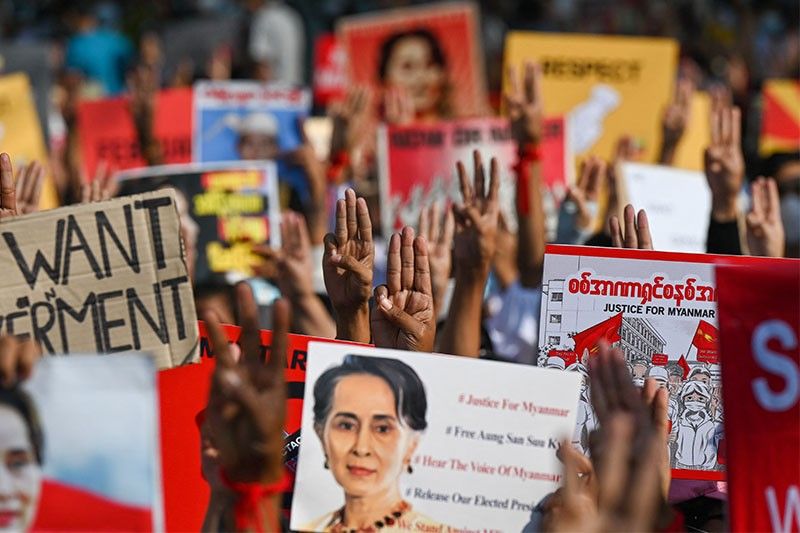UN envoy issues Myanmar warning after Suu Kyi hit with new charge

YANGON, Myanmar — The UN special envoy on Myanmar has warned of the potential for an escalation of violence in the country on Wednesday, as anti-coup protesters are expected to face off once again with the military.
The warning comes after deposed civilian leader Aung San Suu Kyi was slapped with a second charge on Tuesday — and the UN rapporteur hinted she may have even secretly been put on trial.
Myanmar was plunged into an internet blackout for the third night running, Britain-based monitoring group NetBlocks said, as the generals try to wear down the anti-coup uprising.
In the two weeks since the military ousted Suu Kyi and put her under house arrest in the administrative capital Naypyidaw, big cities and isolated village communities alike have been in open revolt.
But Tom Andrews, the UN special rapporteur for Myanmar, said he was worried the situation was spiralling out of control.
"I fear that Wednesday has the potential for violence on a greater scale in Myanmar than we have seen since the illegal takeover of the government on February 1," Andrews said in a statement.
He said he had "received reports of soldiers being transported into at least Yangon from outlying regions".
"In the past, such troop movements preceded killings, disappearances, and detentions on a mass scale," he said.
"I am terrified that given the confluence of these two developments — planned mass protests and troops converging — we could be on the precipice of the military committing even greater crimes against the people of Myanmar."
New charge
The military justified its power seizure by alleging widespread voter fraud in November elections won by Suu Kyi's party.
After her detention in a dawn raid on February 1 — the day of the coup — Suu Kyi was charged under an obscure import and export law, over walkie talkies that were found in her home.
The Nobel laureate's lawyer told AFP on Tuesday she had been hit with a second charge, of violating the country's disaster management law.
"She was charged under section 8 of the Export and Import law and section 25 of the Natural Disaster Management law as well," Khin Maung Zaw told AFP.
While it was unclear how the disaster law applied in Suu Kyi's case, it has been used against deposed president Win Myint — also arrested on February 1 — relating to a campaign event that the junta alleges broke coronavirus-related restrictions.
Khin Maung Zaw added that Suu Kyi and Win Myint, both of whom he has yet to have any contact with, were expected to appear via video conference during a March 1 trial.
But Andrews said he had "word that a secretive trial" of Suu Kyi and deposed president Win Myint had begun this week, without offering more details.
Military spokesman Zaw Min Tun said Tuesday that both Suu Kyi and Win Myint were in a "safer place" and "in good health".
"It's not like they were arrested — they are staying at their houses," the general, who became the country's vice-minister of information after the coup, told a press conference.
The United States and Britain condemned the new charge against Suu Kyi, and renewed demands for her release.
More than 420 people have been arrested since the coup, according to a list of confirmed detentions from the Assistance Association for Political Prisoners monitoring group.
'They want to do bad things'
Security forces have used increasingly heavy measures to quell huge nationwide street protests and a disobedience campaign encouraging civil servants to strike.
Troops have fanned out around the country in recent days.
Rubber bullets, tear gas and even sling shots have been used against protesters.
"They shut down the internet because they want to do bad things," Win Tun, a 44-year-old who lives in the commercial capital Yangon, said Tuesday.
Undeterred, crowds returned to the streets of Yangon and around the country on Tuesday.
"I want more people to join the protests, we don't want to be seen as weak," said university student Thwe Ei Sann.
A large crowd blocked railway tracks outside Mawlamyine to prevent a Yangon-bound train from leaving the port city.
Many of the country's train drivers have joined the anti-coup work boycotts, frustrating junta efforts to restart the national railway network after a Covid-19 shutdown.
'Not what China wants to see'
The United States and Britain were not alone in their condemnation of the leaders of Myanmar's new military administration, which insists it took power lawfully.
The Chinese ambassador to Myanmar said Tuesday that "the current development in Myanmar is absolutely not what China wants to see".
So far, only Washington has announced targeted sanctions against the generals, calling on them to relinquish power.
Military spokesman Zaw Min Tun said that "sanctions are expected", and that the regime would continue to "maintain friendly relations" with the international community.
Follow this thread for updates on the situation in Myanmar, where a coup may be happening after de facto leader Aung San Suu Kyi and other officials have reportedly been detained by the military.
Photo: Military officers wearing facemasks who serve as members of Myanmar's parliament leave after a session at the Assembly of the Union (Pyidaungsu Hluttaw) in Naypyidaw on March 10, 2020. AFP/Ye Aung Thu
Myanmar's junta is endangering the life of jailed democracy figurehead Aung San Suu Kyi, her political party says on Thursday, accusing the military of depriving her of medical care and food.
Suu Kyi has been detained since the generals seized power in February 2021, ending a 10-year democratic experiment and plunging the Southeast Asian country into bloody turmoil.
In recent days, local media have reported the Nobel laureate, 78, was suffering dizzy spells, vomiting and unable to eat because of a tooth infection. — AFP
Myanmar's Aung San Suu Kyi will be pardoned, state media says.
The United States is "deeply concerned" by the decision from Myanmar's ruling junta to extend the country's state of emergency for six months, a State Department spokesman says.
The extension, announced earlier in the day, spelled a delay for elections the military had pledged to hold in August as it battles anti-coup fighters across the country.
"The United States is deeply concerned by the Burma military regime's extension of the state of emergency, which comes as the regime plunges the country deeper into violence and instability," says spokesman Matthew Miller, using an alternate name for the country. — AFP
The United States is "deeply concerned" by the decision from Myanmar's ruling junta to extend the country's state of emergency for six months, a State Department spokesman says.
The extension, announced earlier in the day, spelled a delay for elections the military had pledged to hold in August as it battles anti-coup fighters across the country.
"The United States is deeply concerned by the Burma military regime's extension of the state of emergency, which comes as the regime plunges the country deeper into violence and instability," says spokesman Matthew Miller, using an alternate name for the country. — AFP
Singapore Foreign Minister Vivian Balakrishnan says that conditions were not yet right for ASEAN to open high-level talks with Myanmar on the country's political situation.
"We believe it would be premature to re-engage with the junta at a summit level or even at a foreign minister level," Balakrishnan says when asked about a news report that Thailand had proposed talks.
Speaking in a joint press conference in Washington with US Secretary of State Antony Blinken, Balakrishnan said the leaders of the Association of Southeast Asian Nations had recently reaffirmed their stance. — AFP
- Latest
- Trending


































